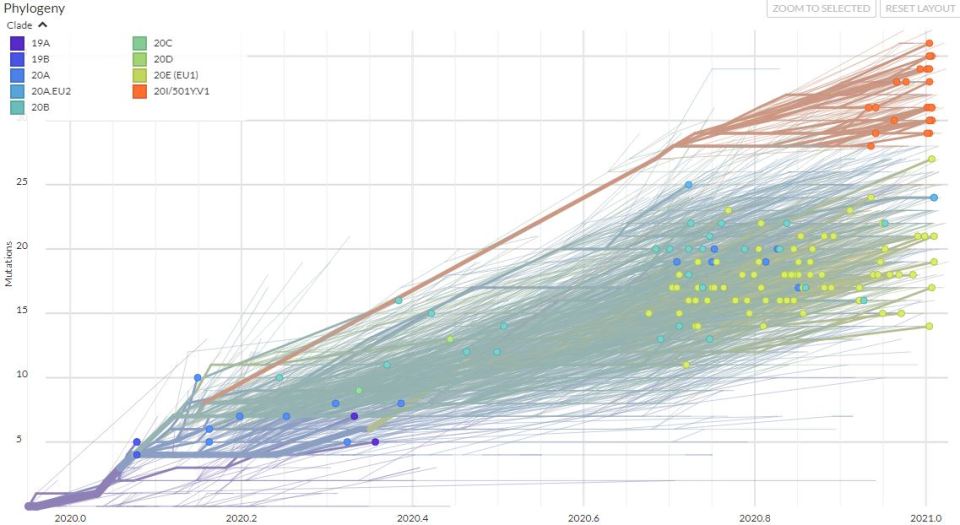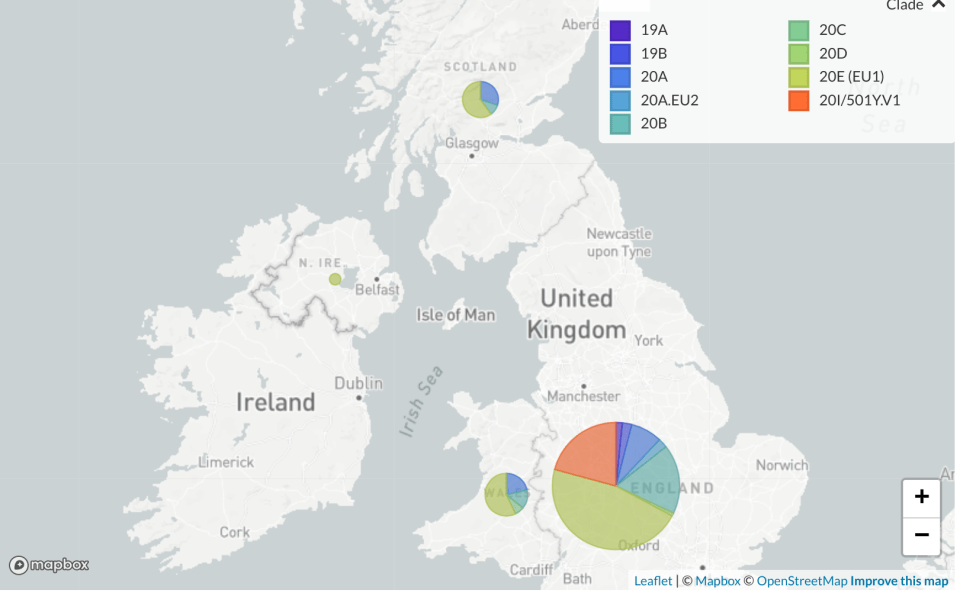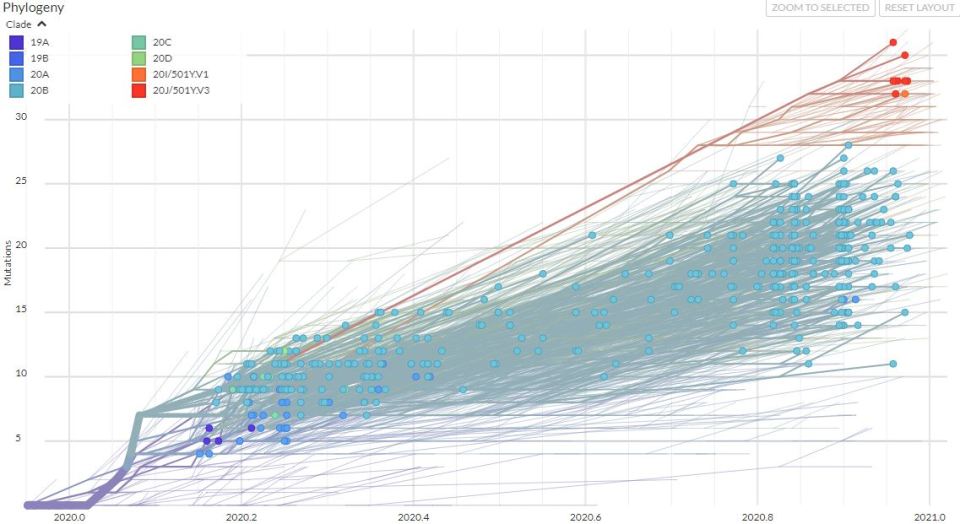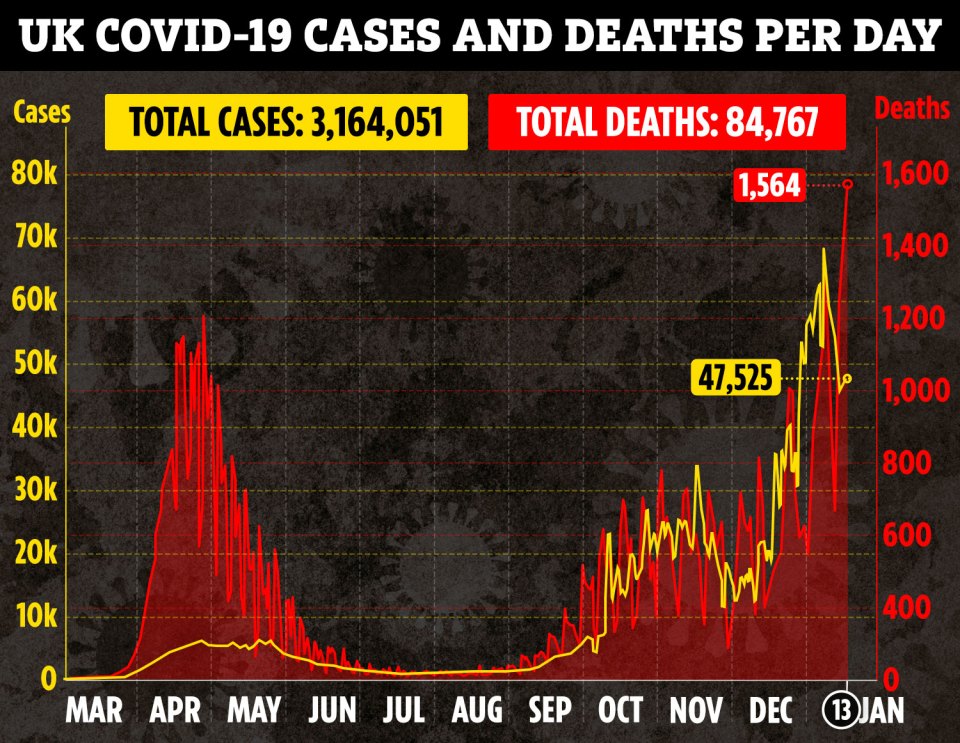More ‘super-Covid’ mutant strains are coming as global surge of cases lets virus thrive, scientists warn

MORE coronavirus 'super variants' could be on the way as infection rates continue to rise globally.
There have been over three million cases of Covid-19 in the UK to date and globally that toll sits at nearly 94 million.
⚠️ Read our coronavirus live blog for the latest news & updates
Globally around 230,000 people a day are being infected and experts have now warned that new variants of the virus could continue to emerge after three more were discovered in the US.
Dr Trevor Bedford, who is a scientist at the Fred Hutchinson Cancer Center in the US explained that the virus is mutating as it is "getting better at getting into human cells".
Referencing the three new strains in the UK, South Africa and Brazil he said: "My (highly speculative!) hypothesis is that the emergence of these variant viruses arises in cases of chronic infection during which the immune system places great pressure on the virus to escape immunity and the virus does so by getting really good at getting into cells."
Looking specifically at the UK strain and government scientists have said that the variant, first found in the South East in September is passed from person to person at a faster rate.
Dr Bedford said the higher viral load in patients contracting the new strain isn't down to how fast it is transmitted.
He added: "Instead it's a knock-on effect of the reactor of evolution occurring in rare chronic infections and then spillover from these infections into the greater population.
"The fact that we've observed 3 variants of concern emerge since September suggests that there are likely more to come."
At present the most vulnerable people in society are being vaccinated with Pfizer/BioNTech jabs and Oxford/AstraZeneca jabs in the UK.
Regulators have prioritised the elderly, people in care homes and health workers as they are more susceptible to contracting the virus.
The older you become, the weaker your immune system gets and weaker immune systems allow viruses to stay in the body for a longer period of time.
This is one of the reasons why vulnerable people - with underlying health conditions, have been told to shield.
The longer the virus is in the system - the longer it is able to learn different characteristics of its host and therefore it learns how to stay around for longer - which is when viruses start to mutate.
WIDE CIRCULATION
Today Ohio officials said they had detected two new strains which originated in the US - one of which has become the dominant strain in the state of Ohio.
One expert said the uptick in mutations the the world is currently witnessing is due to the fact that the virus is being circulated widely.
Dr Ali Mokdad, an epidemiologist with the University of Washington's Institute for Health Metrics and Evaluation said when people are infected for a long time with a virus - it give it more time to mutate.
Commenting on the UK variant he said: "A person who was infected for 12 days was the one who started this whole thing.
"You want [a vaccine] to knock down the virus very, very low.
"We don't want to get this virus used to something in small doses so the virus can develop immunity, we want to make sure that when the virus comes into contact with these immune antibodies, it loses every time, and fast", he told .
Scientists in the US have also discovered another variant in the midwest called 20C-US and scientists say it could be responsible for 50 per cent of cases in the US.
New variants can cause issues for scientists creating vaccines as it's not yet clear whether or not vaccines that have already been developed will work due to a mutation in spike protein.
There are fears the new mutations will be able to dodge the immune system, even after vaccination or previous infection.
Professor Sharon Peacock, who is leading research into new variants in the UK, said some mutations are of "sufficient" concern to need in-depth research in the laboratory.
And the UK’s Chief Scientific Adviser Sir Patrick Vallance admitted “we don’t know for sure” if the vaccines being rolled out on the NHS will work on the strains from Brazil and South Africa.
He told ITV's Peston: “There’s a bit more of a risk that this might make a change to the way the immune system recognizes it but we don’t know.
"Those experiments are underway,” Sir Patrick said.
The vaccines being used in the UK work by instructing the body's own cells to produce spike proteins found on the surface of the virus.
The immune system spots these proteins and develops killer antibodies.
When the real virus comes along, the immune system has a memory of the "spike" on the surface, and is primed to attack it.
Most read in Health News
However a change in the shape of the spike protein makes it more difficult for the immune system to recognise the virus.
It is also unknown whether or not the vaccines already in production will be effective against the strains in the US.
Read More on The Sun
Dr Keith Gagnon, an associate professor of chemistry and biochemistry at SIU said based on the way the virus has mutated so far - vaccines and their efficacy should not be effected.
He added: 'The catch is that the virus continues to evolve, and since May, it has acquired three mutations, and two of them are in the spike protein, one of which might affect antibody binding. There are a lot of unknowns."



















